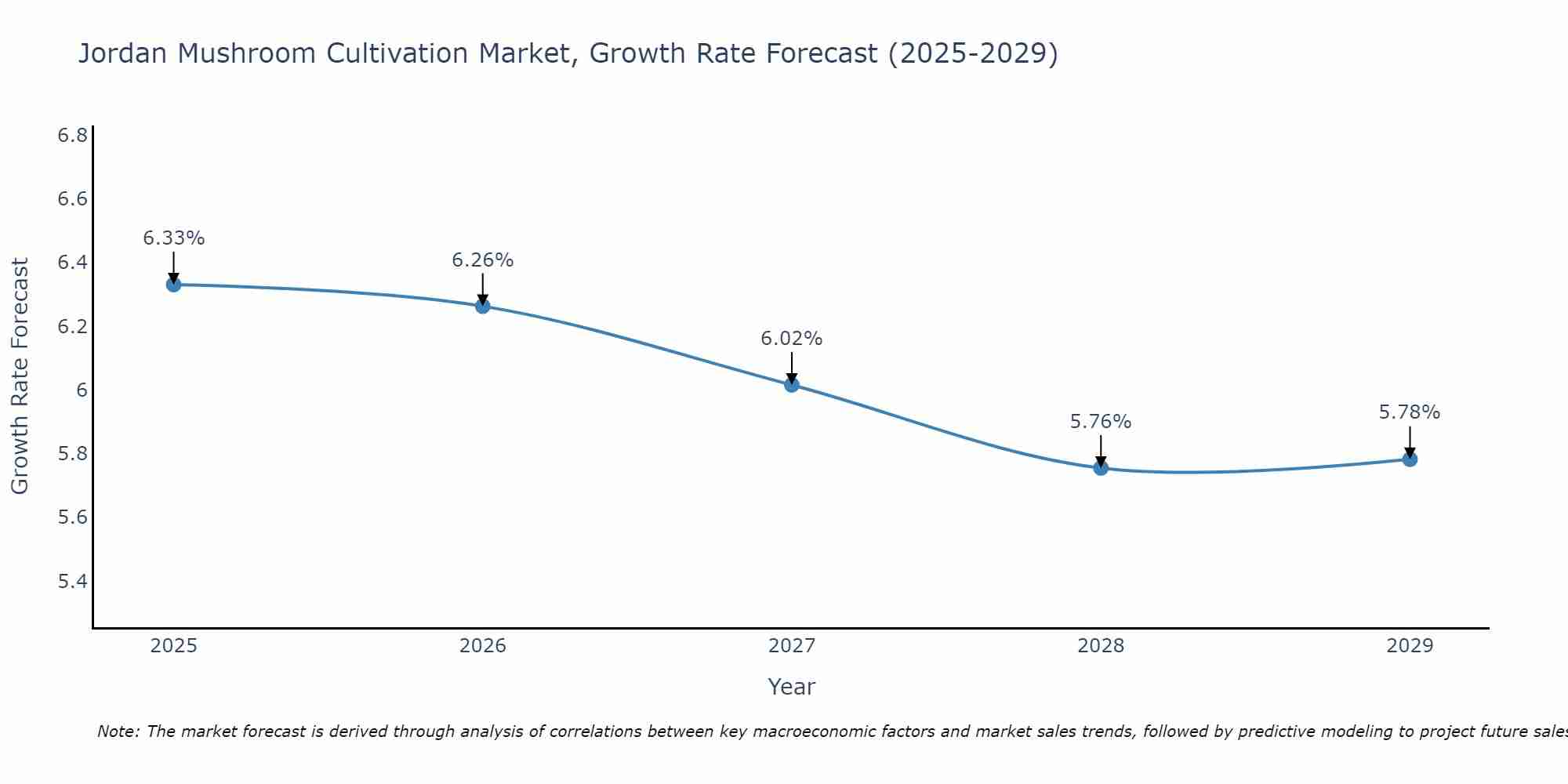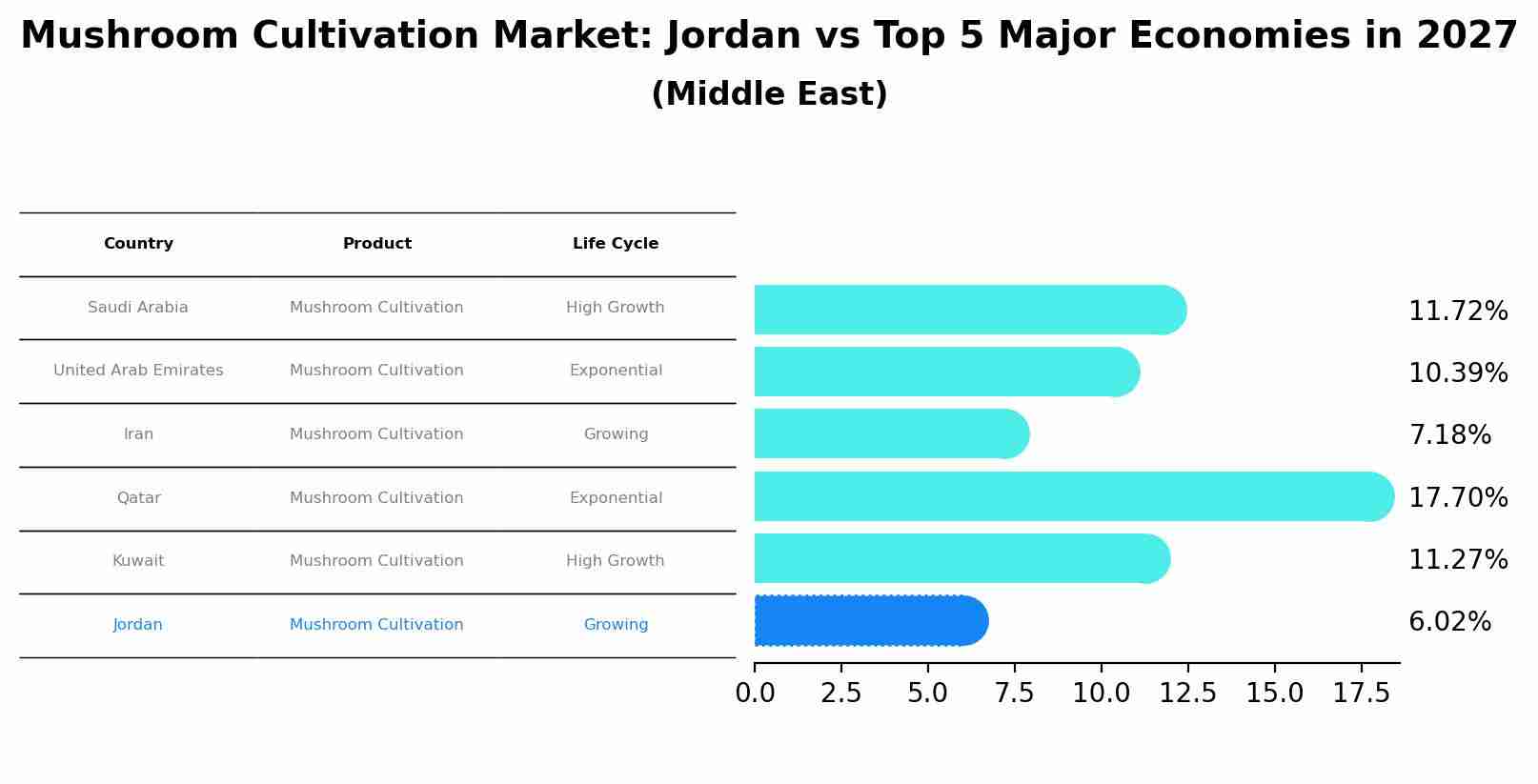Jordan Mushroom Cultivation Market (2025-2031) Outlook | Analysis, Revenue, Companies, Size, Value, Industry, Share, Trends, Growth & Forecast
| Product Code: ETC383146 | Publication Date: Aug 2022 | Updated Date: Apr 2025 | Product Type: Market Research Report | |
| Publisher: 6Wresearch | Author: Shubham Padhi | No. of Pages: 75 | No. of Figures: 35 | No. of Tables: 20 |
Jordan Mushroom Cultivation Market Size Growth Rate
The Jordan Mushroom Cultivation Market is projected to witness mixed growth rate patterns during 2025 to 2029. Beginning strongly at 6.33% in 2025, growth softens to 5.78% in 2029.

Mushroom Cultivation Market: Jordan vs Top 5 Major Economies in 2027 (Middle East)
By 2027, the Mushroom Cultivation market in Jordan is anticipated to reach a growth rate of 6.02%, as part of an increasingly competitive Middle East region, where Saudi Arabia remains at the forefront, supported by United Arab Emirates, Iran, Qatar and Kuwait, driving innovations and market adoption across sectors.

Jordan Mushroom Cultivation Market Overview
The mushroom cultivation market in Jordan is expanding as demand for mushrooms as a nutritious and versatile food source increases. Mushroom farming offers economic benefits and can be integrated into sustainable agricultural practices. The market is driven by the growing popularity of mushrooms in diets and the development of efficient cultivation techniques.
Drivers of the market
The Jordan mushroom cultivation market is experiencing steady growth driven by increasing consumer awareness of the nutritional benefits and culinary versatility of mushrooms. Growing health consciousness and dietary preferences for plant-based protein sources contribute to rising demand. Additionally, initiatives promoting sustainable agriculture and the utilization of agricultural waste as substrate for mushroom cultivation support market growth. Technological advancements in cultivation techniques, such as controlled environment agriculture and organic farming practices, also enhance productivity and quality, driving the expansion of the market.
Challenges of the market
The mushroom cultivation market in Jordan faces issues related to climate conditions and resource availability. Mushrooms require specific environmental conditions for optimal growth, including temperature, humidity, and light, which can be challenging to maintain in Jordan climate. Additionally, there is a need for high-quality substrates and growing media, which can be expensive and difficult to source locally. Ensuring the consistency and quality of mushroom production while keeping costs competitive is a significant challenge. The market must also address issues related to pest and disease management in mushroom cultivation.
Government Policy of the market
The Jordan government supports sustainable agriculture and food security through policies that promote mushroom cultivation. Initiatives include agricultural subsidies, training programs, and research grants to encourage farmers to diversify their crops and adopt modern cultivation techniques. Moreover, the government facilitates market access and export opportunities for Jordan mushroom producers.
Key Highlights of the Report:
- Jordan Mushroom Cultivation Market Outlook
- Market Size of Jordan Mushroom Cultivation Market, 2024
- Forecast of Jordan Mushroom Cultivation Market, 2031
- Historical Data and Forecast of Jordan Mushroom Cultivation Revenues & Volume for the Period 2021-2031
- Jordan Mushroom Cultivation Market Trend Evolution
- Jordan Mushroom Cultivation Market Drivers and Challenges
- Jordan Mushroom Cultivation Price Trends
- Jordan Mushroom Cultivation Porter's Five Forces
- Jordan Mushroom Cultivation Industry Life Cycle
- Historical Data and Forecast of Jordan Mushroom Cultivation Market Revenues & Volume By Type for the Period 2021-2031
- Historical Data and Forecast of Jordan Mushroom Cultivation Market Revenues & Volume By Button Mushroom for the Period 2021-2031
- Historical Data and Forecast of Jordan Mushroom Cultivation Market Revenues & Volume By Oyster Mushroom for the Period 2021-2031
- Historical Data and Forecast of Jordan Mushroom Cultivation Market Revenues & Volume By Shiitake Mushroom for the Period 2021-2031
- Historical Data and Forecast of Jordan Mushroom Cultivation Market Revenues & Volume By Others for the Period 2021-2031
- Jordan Mushroom Cultivation Import Export Trade Statistics
- Market Opportunity Assessment By Type
- Jordan Mushroom Cultivation Top Companies Market Share
- Jordan Mushroom Cultivation Competitive Benchmarking By Technical and Operational Parameters
- Jordan Mushroom Cultivation Company Profiles
- Jordan Mushroom Cultivation Key Strategic Recommendations
Frequently Asked Questions About the Market Study (FAQs):
- Single User License$ 1,995
- Department License$ 2,400
- Site License$ 3,120
- Global License$ 3,795
Search
Thought Leadership and Analyst Meet
Our Clients
Related Reports
- Germany Breakfast Food Market (2026-2032) | Industry, Share, Growth, Size, Companies, Value, Analysis, Revenue, Trends, Forecast & Outlook
- Australia Briquette Market (2025-2031) | Growth, Size, Revenue, Forecast, Analysis, Trends, Value, Share, Industry & Companies
- Vietnam System Integrator Market (2025-2031) | Size, Companies, Analysis, Industry, Value, Forecast, Growth, Trends, Revenue & Share
- ASEAN and Thailand Brain Health Supplements Market (2025-2031) | Strategy, Consumer Insights, Analysis, Investment Trends, Opportunities, Growth, Size, Share, Industry, Revenue, Segments, Value, Segmentation, Supply, Forecast, Restraints, Outlook, Competition, Drivers, Trends, Demand, Pricing Analysis, Competitive, Strategic Insights, Companies, Challenges
- ASEAN Bearings Market (2025-2031) | Strategy, Consumer Insights, Analysis, Investment Trends, Opportunities, Growth, Size, Share, Industry, Revenue, Segments, Value, Segmentation, Supply, Forecast, Restraints, Outlook, Competition, Drivers, Trends, Demand, Pricing Analysis, Competitive, Strategic Insights, Companies, Challenges
- Europe Flooring Market (2025-2031) | Outlook, Share, Industry, Trends, Forecast, Companies, Revenue, Size, Analysis, Growth & Value
- Saudi Arabia Manlift Market (2025-2031) | Outlook, Size, Growth, Trends, Companies, Industry, Revenue, Value, Share, Forecast & Analysis
- Uganda Excavator, Crane, and Wheel Loaders Market (2025-2031) | Strategy, Consumer Insights, Analysis, Investment Trends, Opportunities, Growth, Size, Share, Industry, Revenue, Segments, Value, Segmentation, Supply, Forecast, Restraints, Outlook, Competition, Drivers, Trends, Demand, Pricing Analysis, Competitive, Strategic Insights, Companies, Challenges
- Rwanda Excavator, Crane, and Wheel Loaders Market (2025-2031) | Strategy, Consumer Insights, Analysis, Investment Trends, Opportunities, Growth, Size, Share, Industry, Revenue, Segments, Value, Segmentation, Supply, Forecast, Restraints, Outlook, Competition, Drivers, Trends, Demand, Pricing Analysis, Competitive, Strategic Insights, Companies, Challenges
- Kenya Excavator, Crane, and Wheel Loaders Market (2025-2031) | Strategy, Consumer Insights, Analysis, Investment Trends, Opportunities, Growth, Size, Share, Industry, Revenue, Segments, Value, Segmentation, Supply, Forecast, Restraints, Outlook, Competition, Drivers, Trends, Demand, Pricing Analysis, Competitive, Strategic Insights, Companies, Challenges
Industry Events and Analyst Meet
Whitepaper
- Middle East & Africa Commercial Security Market Click here to view more.
- Middle East & Africa Fire Safety Systems & Equipment Market Click here to view more.
- GCC Drone Market Click here to view more.
- Middle East Lighting Fixture Market Click here to view more.
- GCC Physical & Perimeter Security Market Click here to view more.
6WResearch In News
- Doha a strategic location for EV manufacturing hub: IPA Qatar
- Demand for luxury TVs surging in the GCC, says Samsung
- Empowering Growth: The Thriving Journey of Bangladesh’s Cable Industry
- Demand for luxury TVs surging in the GCC, says Samsung
- Video call with a traditional healer? Once unthinkable, it’s now common in South Africa
- Intelligent Buildings To Smooth GCC’s Path To Net Zero


















